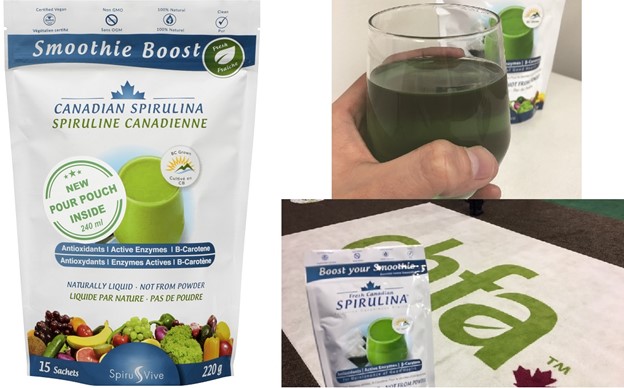AlgaBloom International Ltd
AlgaBloom International Ltd. (AlgaBloom) is the first and only producer of Canadian spirulina, a blue-green algae known for its health benefits.

The company’s flagship product is SpiruVive, a fresh frozen spirulina product that can be used as a smoothie booster to add a broad spectrum of nutrients. Spirulina is nature’s most complete superfood, as it contains 100% bio-available and 100% bio-active live ezymes, anti-oxidants, beta-carotene, essential amino acids, and vitamins. SpiruVive is unique compared to other spirulina products that are typically dehydrated, which means they are not 100% bioavailable, often have a fishy smell, and tend to lump up when mixed with other foods. SpiruVive contains 40 vitamins and more than 2,000 live enzymes that can help maintain health and aid in detox. It is a 100% vegan certified, all-natural, non-GMO, zero-preservative and gluten-free product.
AlgaBloom is the first company in Canada to produce spirulina in a controlled environment, using the purest Canadian natural resources to guarantee quality and cleanliness. Their top-of-the-line facility is certified by the Canadian Food Inspection Agency and Vancouver Coastal Health to ensure food safety and quality assurance. They also strictly adhere to food safety standards and Good Manufacturing Practices procedures. AlgaBloom is also in the process of undergoing Food Safety System Certification 22000 (FSSC 22000).
Located in Richmond, AlgaBloom was established in 2014. The SpiruVive product was created after years of research by co-founder Soheyl, an engineer and inventor with 30 patents. Soheyl and co-founder Susan are driven by a passion for bettering health and nutrition. When spirulina helped their daughter recover from fibromyalgia, they began devoting themselves to bringing fresh spirulina to the world. AlgaBloom’s technology is the most sustainable for spirulina production, as it requires less land space and only uses 10 litres of water per kilogram of spirulina, when typically 1,000 litres would be needed.

